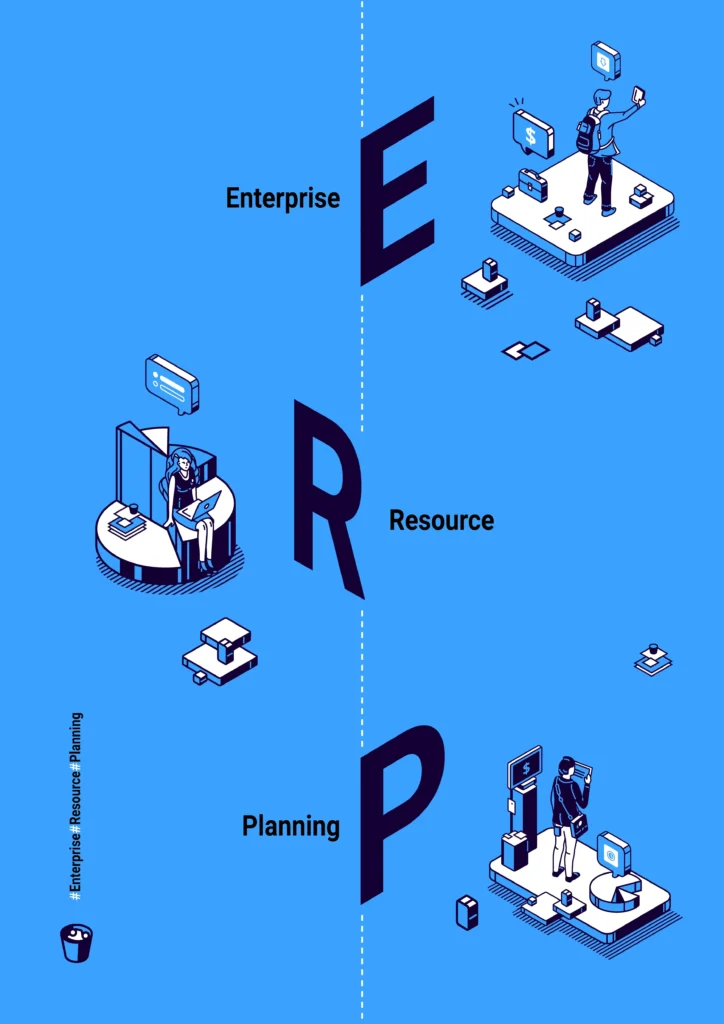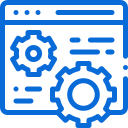ERP Services and Solutions
Unlock the full potential of your business operations with our comprehensive ERP services and solutions.


ERP Services and Solutions
Unlock the full potential of your business operations with our comprehensive ERP services and solutions.
Our Comprehensive ERP Solutions
Our Comprehensive ERP Solutions
From implementation and customization to ongoing support and optimization, our team is dedicated to ensuring your ERP solution aligns perfectly with your unique operational requirements.

ERP Consulting

ERP Development

ERP Customization

ERP Integration

ERP Implementation

ERP Testing

Ready to Transform Your Business with ERP Solutions?
How we make it Happens!
Our ERP implementation roadmap
Our ERP implementation roadmap
1
Discovery and Planning
Thoroughly assess business needs and objectives to define project scope, key performance indicators (KPIs), and create a detailed project plan.
2
Technology Selection
Design the system architecture and select the appropriate ERP technology stack to meet business requirements.
3
Planning
Define project scope, objectives, KPIs, and create a detailed project plan with timelines and resource allocation.
4
Customization/Development
Tailor the ERP solution to specific business processes, configuring modules, workflows, and developing any necessary additional functionalities.
5
Data Migration and Validation
Extract, clean, and validate existing data for migration, ensuring accuracy and integrity in the new system.
6
Testing
Thoroughly validate ERP software functionality, performance, and usability to ensure it meets the company’s requirements and user expectations.
7
Deployment
Roll out the ERP solution across the entire organization, ensuring seamless integration with existing systems.
8
Launch
Officially launch the ERP system, making it accessible to all end-users and stakeholders
1
Discovery and Planning
Thoroughly assess business needs and objectives to define project scope, key performance indicators (KPIs), and create a detailed project plan.
2
Technology Selection
Design the system architecture and select the appropriate ERP technology stack to meet business requirements.
3
Planning
Define project scope, objectives, KPIs, and create a detailed project plan with timelines and resource allocation.
4
Customization/Development
Tailor the ERP solution to specific business processes, configuring modules, workflows, and developing any necessary additional functionalities.
5
Data Migration and Validation
Extract, clean, and validate existing data for migration, ensuring accuracy and integrity in the new system.
6
Testing
Thoroughly validate ERP software functionality, performance, and usability to ensure it meets the company’s requirements and user expectations.
7
Deployment
Roll out the ERP solution across the entire organization, ensuring seamless integration with existing systems.
8
Launch
Officially launch the ERP system, making it accessible to all end-users and stakeholders


Why Choose ZOPIQA
Our Competitive Advantages
High Quality
Crafting Excellence, Every Step of the Way
Result Driven
Achieving Success Through Strategic Solution
Cost Effective
Maximizing Value, Minimizing Costs
Scalable Solutions
Growing with You, Scaling Your Success
Our ERP capabilities
Master Your Operations with Robust ERP Capabilities
Master Your Operations with Robust ERP Capabilities
Data consolidation
Efficiently aggregate and centralize data from various sources and departments within your organization. This capability ensures a unified and accurate view of your business operations, enabling better decision-making and strategic planning.
Automation
Streamline repetitive tasks and processes with automated workflows. From order processing to reporting, automation enhances operational efficiency, reduces manual errors, and allows your team to focus on higher-value activities.
BI and analytics
Leverage powerful BI tools and analytics to transform raw data into actionable insights. Visualize trends, track KPIs, and make data-driven decisions that drive growth and improve overall business performance.
Accounting and financial management
Effectively manage financial transactions, reporting, and analysis. This capability covers everything from general ledger and accounts payable/receivable to financial reporting, helping you maintain accurate financial records and comply with regulatory requirements.
Customer relationship management (CRM)
Nurture strong customer relationships with a comprehensive CRM system. Track interactions, manage leads and opportunities, and gain insights into customer behavior. This capability empowers you to deliver personalized experiences and drive customer loyalty.
Human resource (HR) management
Efficiently manage HR processes, including recruitment, employee onboarding, performance evaluation, and workforce planning. This capability helps optimize HR operations, ensuring your organization has the right talent in the right roles.
Supply chain management (SCM)
Optimize the end-to-end supply chain process, from procurement to production, warehousing, and distribution. With SCM capabilities, you can enhance visibility, reduce costs, and improve delivery timelines, ultimately boosting customer satisfaction.
Get Quote
Let’s talk
Your Vision Our Expertise, Contact us Now and Get Started!
FAQs
Here are some frequently asked questions
Don’t shy away from using this helpful block to guide your website users to useful pages.
What is ERP and why does my business need it?
ERP, or Enterprise Resource Planning, is a software system that integrates various business processes and functions into one centralized platform. It helps streamline operations, improve efficiency, and enhance data visibility across the organization. Implementing ERP can lead to better decision-making, cost savings, and increased competitiveness in today’s fast-paced business environment.
How do I know if my business is ready for ERP implementation?
Signs that your business is ready for ERP include experiencing rapid growth, struggling with disconnected systems, or facing challenges in managing data effectively. If you find it increasingly difficult to track processes, inventory, or financials, it may be the right time to consider ERP implementation.
How long does it typically take to implement an ERP system?
The timeline for ERP implementation varies depending on the size and complexity of your business, as well as the scope of customization. On average, it can take anywhere from several months to a year to fully implement an ERP system.
What kind of training and support do you provide during and after ERP implementation?
We offer comprehensive training programs for end-users and administrators to ensure a smooth transition to the new ERP system. Additionally, our team provides ongoing support and assistance post-implementation to address any questions or concerns that may arise.
How does ERP contribute to better decision-making?
ERP systems provide real-time access to critical business data and analytics. This enables informed decision-making by offering insights into areas such as sales trends, inventory levels, financial performance, and more. With accurate and up-to-date information, you can make timely and strategic decisions.
How do I get started with your ERP Services and Solutions Services?
Getting started is easy. Simply contact us and we’ll schedule an initial consultation to discuss your project, goals, and how our services can best meet your needs.



